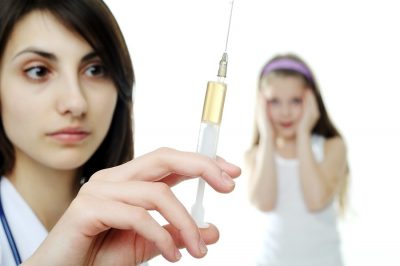Vaccination remains one of the mostly hotly contested health issues in our society.
Unfortunately, both sides of the debate like to play dirty. Anti-vaccine voices tend to be loud and angry, hurling alarmist accusations against the “evil” and “greedy” manufacturers of vaccines. Vaccination advocates tend to resort to petty name-calling and other minor slander tactics, dubbing the “anti-vaxxers” backward-thinking impediments to a healthy, well-functioning society.
Needless to say, the right approach to this controversial issue probably lies somewhere in between these two extremes.
A twelve-year-old girl named Meredith Prohaska received Gardasil (the HPV vaccine). Later in the afternoon, her mother found her unresponsive on the floor, and she was pronounced dead in the hospital
Before we dive into a further discussion of this debate, though, it’s worthwhile to report one prominent strike against the vaccine industry. While this event occurred in 2014, it still serves as a stark reminder of the risks associated with the HPV vaccine. A twelve-year-old girl named Meredith Prohaska received Gardasil (the HPV vaccine). Later in the afternoon, her mother found her unresponsive on the floor, and she was pronounced dead in the hospital shortly thereafter.
Doctors recommend that all girls and boys get the HPV vaccine series at age 11 or 12 — though it’s possible to get the vaccine as early as age 9. HPV vaccination is touted to protect men and women from the infections that cause most cases of anal cancer, mouth/throat cancer, and genital warts — as well as many cases of cervical, vaginal, and vulvar cancer in women, and penile cancer in men.
The administering physician and other authorities were quick to assure the family that the vaccine did not cause her death. Pro-vaccine individuals often rest on such “correlation does not equal causation” arguments, but it’s harder to accept in this case.
After all, Meredith Prohaska died the same day the HPV vaccine was administered. Meredith’s family also added that she was extremely active, perfectly healthy, and had no previously existing conditions.
Furthermore, this tragic event is not the first strike against the HPV vaccine—there are currently 50,941 cases logged in the Vaccine Adverse Event Reporting System (VAERS). This count includes more than 100 deaths since the market release of the first HPV vaccine in 2006, even when outliers are excluded (such as reported deaths that occurred a year or more after administration of the vaccine).[1]
Vaccination advocates work tirelessly to erode the legitimacy of these reports, insisting instead that vaccines are perfectly safe. Perhaps they deserve to be given the benefit of the doubt, but it’s hard to ignore 50,000 individual complaints (and this number doesn’t even include the individuals who didn’t submit a report).
Also, it’s difficult to believe that vaccine manufacturers are unbiased about their product and have only our best interest at heart, given that they generate nearly $2 billion every year from vaccine sales.
So what should we believe about vaccines?
The death of Meredith Prohaska was inarguably a tragedy, and even the possibility that it was caused by a vaccine should cause all of us to question the safety and merit of vaccination.
However, does this horrific event prove that vaccine manufacturers are heartless, greedy souls who care little about the death of children? Should we believe that there’s a hidden agenda at play, one that involves the willful use of dangerous medical technologies simply for profit?
The answer is not a simple one. As we mentioned above, seeing the whole picture from a balanced perspective requires some critical, unbiased thinking.
First and foremost, it’s simple-minded to call the vaccine industry unconditionally evil. Many vaccine supporters (including those involved in the underlying biotechnology development) genuinely believe that vaccination is a positive medical innovation that has greatly aided humanity—and they’re not necessarily incorrect. Plenty of arguments suggest that vaccination has helped us take steps toward the eradication and control of severe infectious disease.
The dark side of the vaccine industry is its continuous tendency to downplay the risks of vaccines
This is obviously not the full story, though. The dark side of the vaccine industry is its continuous tendency to downplay the risks of vaccines—and there’s no denying that this is a huge problem.
Think about it this way: if you had 100 pieces of candy, and you knew that one of them would kill someone if you distribute all of them, would you still give out the candy? Almost certainly not, right? The vaccine industry, on the contrary, has decided that a certain number of adverse effects and deaths are acceptable, since the total number of vaccinations given is so much higher.
This is reminiscent of the auto industry’s disturbing policy about recalls: unless the incidence of malfunctions (which often cause lethal auto accidents) reach a certain number, the part or vehicle will not be recalled.
Here’s the bottom line: the vaccine industry needs to be much more proactive about acknowledging the risks of vaccination.
If the practice is going to continue in any capacity, measures need to be taken to determine what factors place a person at higher risk for adverse vaccine effects. Vaccine manufacturers and physicians need to take responsibility for the fact that vaccination is not universally safe, and that in many individuals, the adverse effects far outweigh the benefits.
And finally, individuals need to be empowered to make their own decisions about vaccination—instead of being pressured into it by convention (and then ridiculed and shamed for choosing to forego vaccination).
Vaccination may not be going away anytime soon, but the least we can do is advocate for more enlightened policy surrounding its use—greater transparency about risks, more research into what lifestyle and genetic factors may contribute to higher risk, and the assurance that each individual can choose whether vaccination is right for them.
References






